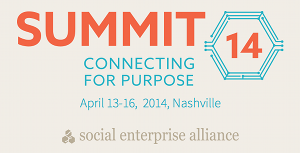
By Robbie Hall
With 405 registered attendees and 37 represented social enterprises, the Nashville Social Enterprise Alliance Summit '14 began with a tremendous start. This year’s theme, “Connecting For Purpose,” aimed to create person-to-person engagement and interaction at every step. With tools like Pathable, attendees could stay up to date on the speaker directory and event schedule, and connect to a community of other individuals who are ready to produce massive social impact through successful social enterprises and networking.
Whether being motivated while listening to a dozen of our colleagues share during the Spark Stories session or having our eyes opened with new solutions to old problems in the workshops and keynotes, there was no lack of inspiration at this event. Constantly, I found myself scrambling to put pen to paper and absorb the wealth of knowledge and advice given by industry leaders who were offering a new way of seeing the economy.
One such session that stood out to me was “The Solution Revolution” with Bill Eggers, Javier Flaim, Elizabeth Schwan-Rosenwald and Jim Fruchterman. In the session, these thought leaders hit on a repetitive theme and topic of the day -- which was finding a new perspective, a new lens, a creative way to conquer an existing problem.
Bill Eggers, author of “The Solution Revolution,” focused on this by honing in on tough societal problems, as well as citizens and social enterprises, and how they are relying less on government-only solutions. Instead, we are seeing more weight leaning towards the solution economy perspective. Bill took us through the example of traffic congestion. Traditionally the response might have been to invest in more or new roads, in additional bus services, or the introduction or extension of mass transit services such as subways.
The solution economy perspective however presents a range of other options that collectively offer an emerging congestion relief system. Elements include:
- Ridesharing (facilitated by services such as Carma or Carpooling.com)
- Car-sharing (such as services as Car2Go or Zipcar)
- Bike-sharing (e.g. Capital Bikeshare)
- Personal travel assistant apps
- Mobile parking apps (such as San Francisco’s SFpark)
- Real time traffic management and tracking
- Telecommuting
- Integrated fare management.
While these solutions may not fully ‘solve’ the issues, they do greatly relieve the pressure and reduce the costs associated with traditional methods.
A further example he shared was that of Dean Kamen’s Slingshot water purifier. Dean developed the purifier in the private sector, but ultimately he had trouble finding partnerships with global health institutions, so instead partnered with Coca-Cola to bring it to those most in need. “By 2015, Coca-Cola and partners plan to bring 100 million liters of clean, safe drinking water to 45,000 people across 20 countries.”
Bill explained that through the solution economy perspective, we need to look differently at who we could partner with to achieve our goals, not just the traditional avenues that we might have intuitively relied on in the past.
To Javier Flaim, of Recyclebank, this meant finding a better way to recycle waste and engage a community. Now we are not talking about the proverbially sense of waste as in an earlier post but instead the physical sense. Think landfills and garbage bins full of items that could and should be recycled but somehow never are. What new way of thinking can help solve this crisis that is so damaging to our planet?
The solution comes from the company's creative method that helps create a more sustainable future by rewarding people for taking everyday green actions with discounts and deals from more than 4,000 local businesses and national brands. The company empowers individuals to make a collective impact on the environment by increasing household recycling and taking other environmentally-friendly actions. The company made it measurable, adding sensors to the trucks so that they know exactly how many pounds are loaded onto the truck and recycled house-to-house and community-to-community.
“Recyclebank has a rich history of innovation and environmental impact. Over the years, we’ve seen that while recycling is often the gateway into sustainable behavior change, our more than four and a half million members are eagerly looking for new ways to deepen their commitment to a greener lifestyle,” said Flaim.
Elizabeth Schwan-Rosenwald offered some critical insight as well -- not in the sense of physical waste but through pro bono. She sets the strategy in the creation of a thriving pro bono marketplace in each city. Typically you would not think of the social enterprise sector as the pro bono avenue, but by changing the way you look at an existing issue and adding some new perspective we find a powerful tool to create social impact.
"Pro bono is the key to changing how the social enterprise sector looks at problem-solving. When strong pro bono resources are in place the result is a flourishing sector that has the supports necessary for growth," said Schwan-Rosenwald.
For example, she mentioned Hilton, who is considered first in class in regards to hospitality. Hilton approached her with an offer to provide their expertise in hospitality as a pro bono service. Not the typical thought when it comes to pro bono but a game changer if we wrap our minds around the concept. What if industry experts, in development, design, implication, delivery and almost all fields, offered up their knowledge and experience as a pro bono service to the social enterprise and non-profit sector? The end result would be astounding social impact and change fueled by the leaders of these industries, companies who are already doing it right and ready to share that knowledge with others who want to make a difference in this world.
Image courtesy of the Social Enterprise Alliance
TriplePundit has published articles from over 1000 contributors. If you'd like to be a guest author, please get in touch!














